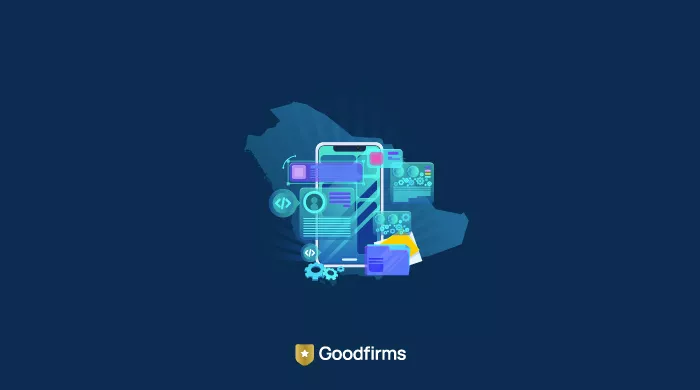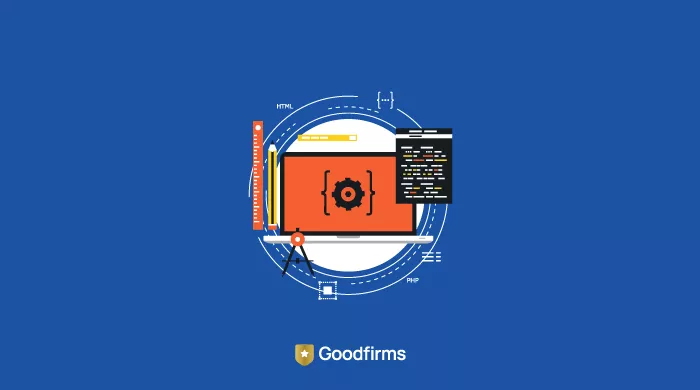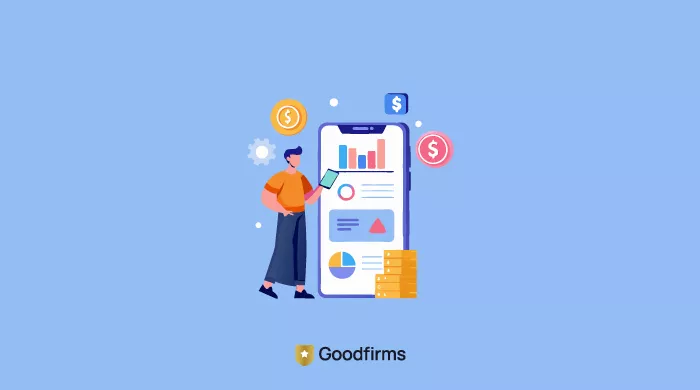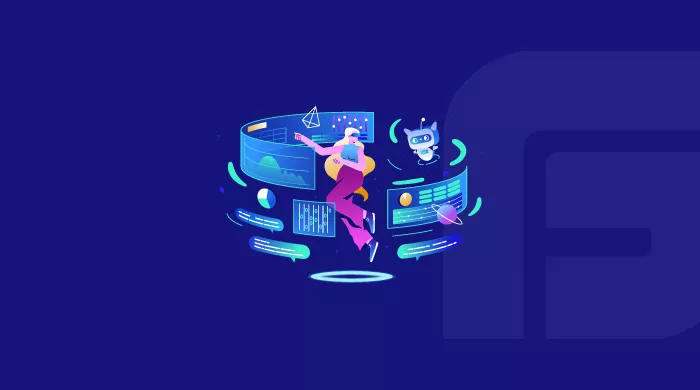Mobile apps are at the forefront of consumer software. They are our little portals to the internet.
Apps facilitate every function we perform via our phones, making them the most significant software category for internet users. But much like everything else online, these apps that we've become so familiar with are subject to change as well. They change and evolve under market pressures, ever transforming into better, more engaging versions of themselves.
Over time apps gain and lose features; they can turn into super apps that span continents or niche and lean products tailored for specific demographics. Either way, it is crucial for app development companies and mobile users to understand how the app landscape changes.
But that said, writing a post on upcoming mobile app development trends isn't necessarily required. If you are the target audience for this post, you'll already be aware of how '5G is taking over the world' and when Skynet plans to send off the nukes. But marketing cliches and Terminator references aside, I want to build a comprehensive and cohesive case as to why these popular trends are hyped to be as popular as they are.
To do so, I'll rank leading trends based on critical factors; this will give us an understanding of how prominent a particular trend is compared to the rest. Don't worry if all of this sounds too confusing; it'll make perfect sense in the coming section. Meanwhile, for readers who would like a gist of the post before committing to reading, here is the ranking and reasoning summarized.
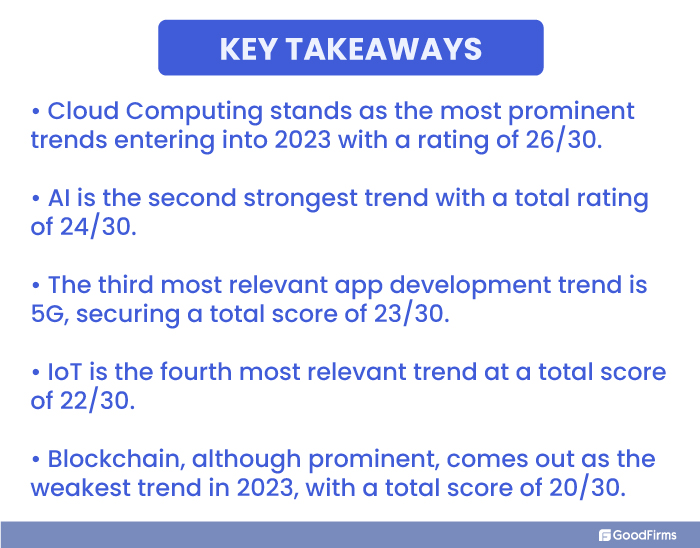
Ranking factors for Leading App Development Trends
To find out how prominent a trend or technology is going to be in 2023, we can judge them on three main criteria: Adoption, Functionality, and Impact. I'll be giving out scores (out of 10) for each category to every trend. In case it isn't obvious what the categories mean, here is a quick breakdown:
- Adoption: This is a measure of how far down the trend is on the adoption curve. Is every potential use case of the technology realized within the app space? How many apps are already powered by the tech as we speak?
- Functionality: Functionality is a measure of how 'groundbreaking' the new feature or tech is. Is it just a minor quality-of-life improvement? Or a complete game changer in the mobile industry?
- Impact: This is a measure of how the tech in question will impact other technologies, ecosystems, apps, and devices. Is the trend just a stand-alone development? Or can engineers build better systems using it?
Ranking the Top Mobile app development trends for 2023
With our parameters and trends well-defined, let's dive into the ranking. To justify these rankings, I've added data from credible sources and offered my own reasoning wherever possible. However, I must admit these comparisons cannot be fully objective, partly because the trends, their application, and use cases cannot all be discussed on a common, comparable level and also because my understanding (and the data I used) could be incomplete, out of context or simply outdated.
#1 App Development Trend: AI
AI is one of the leading technologies in the coming decade, not just within app development but within the software space itself. The early half of 2022 saw the development of intelligent machine-learning models like Dall-E and GPT3. But these models are now making their way into commercial software, which will usher in a new era of AI-based software and app development.
Most businesses today, including app development companies, are in a position of being able to leverage AI to massively improve their operations and products. Speaking specifically of app development, AI can be utilized in several ways to improve mobile applications' performance and engagement.
In a detailed report exploring how AI and machine learning can be used in mobile app development, we elaborate on how AI is widely used in predictive analytics, virtual assistant, and data mining. Understanding and adapting to user behavior is crucial for apps in order to maintain user engagement, and the most efficient way to achieve this level of granular understanding is by deploying clever machine learning algorithms that teach themselves based on user data.
AI can also be used as the product itself. For instance, countless note-taking and editing apps offer writing assistants. Voice assistants have already become a significant part of our culture. Recommendation on every content app is primarily AI-driven, and soon enough, the content will be too. Considering all of this, it must be obvious how AI will be a massive driver of innovation for app development companies in Chicago and worldwide in the coming year.
The future of AI in App Development: Scores and discussion

Adoption: As mentioned, AI has made its way into countless applications, either on the backend or directly as the product. The biggest example of AI adoption in mobile apps is perhaps that of voice assistants, where the adoption rate sits at an absolute 100%. Meaning every mobile device has at least one AI-powered app (voice assistant), based on which I think it is fair to give AI an adoption score of 8/10. It is a popular technology with excellent market penetration, but its applications are still far from being fully realized.
Functionality: For anyone familiar with the AI and app development space, AI has already proven itself to be a game changer. Almost every content moderation algorithm today is powered by AI. If we consider shopping apps, AI allows e-commerce offerings to be more personalized. And there are way too many use cases like such to be mentioned here. AI has played a major role in shaping what modern apps look like, earning it a Functionality score of 8/10.
Impact: When it comes to understanding the impact AI may have on other technologies, the story isn't so straightforward. AI may be more of a standalone technology, currently employed as an exhaustive solution to previously difficult problems, like how Google is using AI in the coming android version to improve battery life and Google Lens to extract better performance for media. But despite being standalone solutions, the sheer scale of these is likely to change so many systems at multiple different levels that AI's impact can barely be termed modest. Considering the technology's future prospects, AI can be rated with an impact score of 7/10.
Totaling the three, AI secures a final score of 24/30 on our top mobile app development trends.
#2 App Development Trend: Blockchain
Blockchain is another emerging technology that promises to revolutionize the digital space. However, unlike AI or other techs, Blockchain doesn't have many clear use cases when it comes to apps (yet). What it does have, however, are certain advantages that could benefit mobile applications when implemented well. Let's explore these in further depth:
Secure User data:
Thousands, if not millions, of users lose their sensitive data to attackers each year because large corporate servers aren't necessarily safe enough. Instead, if corporations opt for restricted DLT for storing small amounts of user data, they can allow access to specific users alone, Improving app security by many folds.
Decentralized and trustable apps:
Another major concern within the app space is the lack of trust users are developing toward Big Tech. People do not trust a central authority with their data anymore, and we are already in the middle of a massive worldwide shift towards open-source and decentralized solutions. Blockchain presents itself as a trust-free alternative. Since a central authority doesn't control a decentralized ledger, a blockchain-based solution can be a good way of winning consumer trust for companies not keen on data mining.
How Will Blockchain Impact Mobile App Development? Scores and Discussion
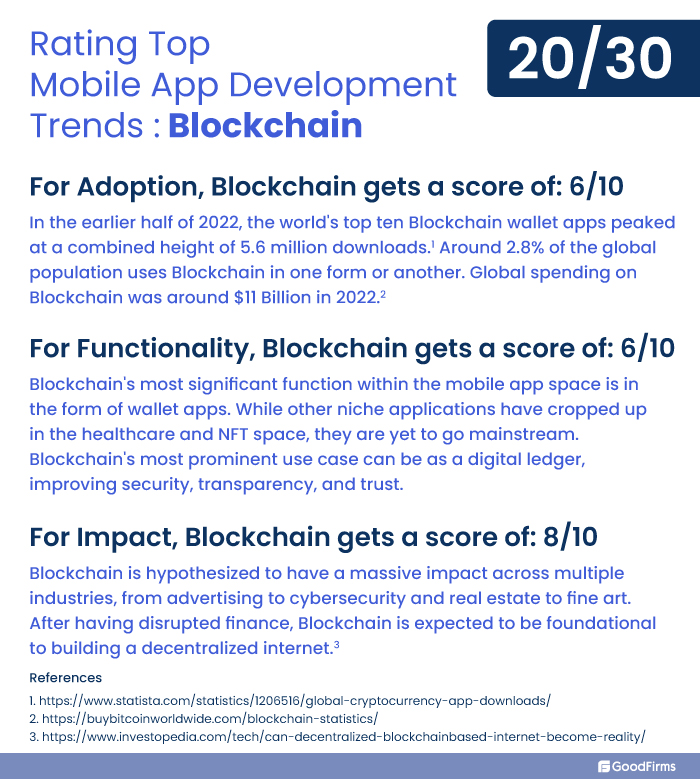
Adoption: As mentioned, Blockchain doesn't have many direct use cases within app development. Its most significant use case would be within crypto wallet apps like Coinbase and even mainstream payment apps like Venmo. Blockchain's already popular application within cryptocurrencies makes it essential for building decentralized finance applications. In recent times, Blockchain has also found niche use cases within games and medical apps; however, its full potential is yet to be explored. Overall, Blockchain gets a 6/10 for adoption because the numbers are promising, but we aren't even close to mass adoption within the app space yet.
Functionality: Blockchain is often referred to as 'revolutionary' for the ripples it has created within finance. However, the reason why Ethereum hasn't replaced Visa yet is because Blockchain does have significant limitations, most notably its scalability and speed. Without getting into the details, suffice to know that Blockchain still has roadblocks to overcome, and some of the smartest Blockchain and mobile app development companies in healthcare, finance, and software industries are working on making it more practical. Blockchain's functionality score, therefore, comes at a 6/10.
Impact: Blockchain, if it ever manages to go mainstream, will perhaps have the biggest impact on how we structure the internet. A decentralized internet will be founded on transparency and user-first principles. Blockchain will specifically transform mobile apps in the form of dApps, which will span entire ecosystems that function in fundamentally different ways than traditional systems. Given Blockchain's massive potential, it gets a score of 9/10 for impact.
Blockchain Secures a final score of 20/30 on our top mobile app development trends.
#3 App Development Trend: 5G
5G has been in the talk for around half a decade now, but finally, 2023 seems to be the year when we'll see it significantly impact the market. Implementing major technologies like 5G doesn't happen overnight and requires the hardware to show up before the software does, which is essentially what is happening. According to Statista, 5G networks have been launched in major parts of the world, and the rest are sure to follow soon, as of June 2022.
On the manufacturing side, most newly launched smartphones today are capable of utilizing at least 2-4 5G bands. Meaning the two most significant factors affecting 5G adoption on the hardware side are set in place. Now it is up to app development companies to build apps that can leverage and popularize 5G.
Theoretically, 5G connectivity will significantly boost download and upload speeds, improve latency, significantly bump up available bandwidth, etc. This will open up a whole new realm of possibilities for app developers worldwide to innovate and experiment with. But 5 G's biggest advantage will be observed on a collective level. Rather than just making individual mobile devices 10X faster, the true benefit from 5G will come from how these much faster devices interact with each other. With better network capacities and advances in IoT, smart homes will become truly smart, and smart cities will become an achievable reality.
5G will produce a multi-faceted transformation within mobile app development: Scored and Discussion
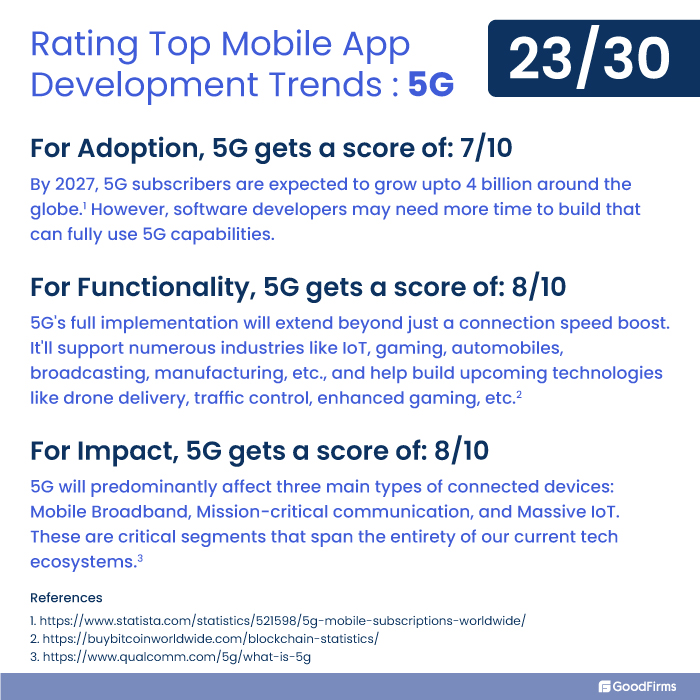
Adoption: A recent report from Ericsson predicted around 510 million new users would sign up for 5G in 2023. As mentioned, the hardware infrastructure for 5G is already taking shape globally, but depending upon how quickly app developers can begin to take advantage of the technology we may see quick to rapid adoption in the coming year. 5G gets a score of 7/10 for adoption.
Functionality: The reason behind 5 G's popularity is that it promises to improve not just a specific aspect of mobile apps but the entire mobile app experience. 5G will help apps with better connectivity, faster internet speeds, higher bandwidth, and significantly reliable connections, all of which earns it a score of 8/10 for functionality.
Impact: If true 5G is anything like what it is promised to be, then it is sure to transform the app development process for good. With faster and more reliable internet speeds, apps will be able to rely much more heavily on the cloud, allowing for complex apps to load up significantly faster. 5G will also facilitate the IoT revolution with better connectivity. All things considered, 5G gets a solid 8/10 for impact.
5G gets a total rating of 23/30 on our mobile app development trends ranking list.
#4 App Development Trend: IoT
IoT devices are taking over the world, and they'll do so via mobile applications. IoT stands for internet of things; it's a popular term describing the network of physical devices or 'things' that are interconnected via the internet.
What's the advantage of turning ordinary things into smart devices? Well, there are many. For starters, smart devices offer better accessibility, customization, and control. They also produce valuable device data that can be extremely insightful for designers and product developers.
In fact, IoT has already made its way into our lives. Calling a cab online, turning on the living room lights with our phone, smart thermostats, and AirTags are all examples of IoT devices we use on a daily basis. The appeal of IoT comes down to not just the individual devices themselves but the capacity of the network that is built when these devices come together.
IoT Devices will Make the World Smarter Using Mobile Apps: Scores and Discussion

Adoption: In 2020, the number of IoT devices surpassed the number of non-IoT devices globally. Meaning IoT adoption is at a peak and only likely to go further. With 30 billion IoT devices expected to be around by 2025, the coming year will certainly be huge for IoT adoption. IoT gets a solid 8/10 for adoption in 2023.
Functionality: IoT-focused mobile applications will be a big part of our lives. They'll enable us to better interact with smart devices giving us granular control over various aspects of our lives that previously weren't digitized. Considering this, IoT gets a score of 8/10 for functionality.
Impact: What will be IoT's impact on the mobile app space and within Tech as a whole? IoT will surely inspire a long list of IoT and automation apps, but these will still be a dedicated category much disconnected from the app development space. Whether or not these IoT apps will expand to go above and beyond their niche is yet to be seen, which is why IoT gets a humble 7/10 for impact.
IoT gets a total score of 22/30 on our mobile app development trends list.
#5 App Development Trend: Cloud Computing
Cloud computing for mobile apps, or mobile cloud computing as it is often called, brings forth the perfect blend of computational power and portability. Most of our digital lives are facilitated via our phones, and as apps continue to assume bigger, more complex roles in our lives, it becomes hard for mobile app developers to balance performance, speed, and user-friendliness.
As apps grow in demand and functionality, it becomes increasingly difficult to run them natively on user devices. This is the appeal of mobile cloud computing. It frees apps from being tied to the limitations of native devices.
Cloud computing for mobile apps can help with data storage, data processing, protecting proprietary software, and ensuring data security, which is why cloud computing has become central to iOS and android app development companies alike.
Why Cloud Computing is Essential for Mobile App Development: Scores and Discussion

Adoption: Cloud computing has already made its way into the app development space; in fact, the reason why it is a prominent trend is precisely because cloud computing offers some critical features, building an app without which is next to impossible in 2023, earning cloud computing a score of 9/10 for adoption.
Functionality: Cloud computing offers a safe and efficient way for mobile app businesses to offer data processing services. The cloud acts as the storage and computational hub for apps, allowing them to focus security and optimization on a singular point in the network while distributing the benefits across to all customer devices. All in All, mobile cloud computing is an incredibly useful technology that has completely changed how we build apps, for which it gets a score of 8/10 for functionality.
Impact: The implementation of cloud computing in mobile app development has normalized and encouraged the server-based software services that can be accessed 'on the go'. Tie that with the portable and easy-to-access nature of smartphones, and this appears to be a match made in heaven. Cloud computing-based apps can be argued to have better compatibility with other cloud-based solutions, which, in theory at least, could encourage cross-pollination of resources, data, and solutions across other cloud-based platforms and solutions in the future. Given the potential for such a large impact, cloud computing gets a solid 9/10 for impact.
Given its prevalence and utility, cloud computing gets a leading score of 26/30 in our mobile app development trends.
Conclusion
Mobile apps are all around us, touching numerous aspects of our lives that we would never previously have imagined to be digitized. The app development landscape is a constantly evolving one, and now that we understand what trends are the most prominent in the app space, we are better equipped as businesses and consumers to bet on technologies that will dominate our future.
Do you agree with our assessment of upcoming app development trends? Let us know below.





